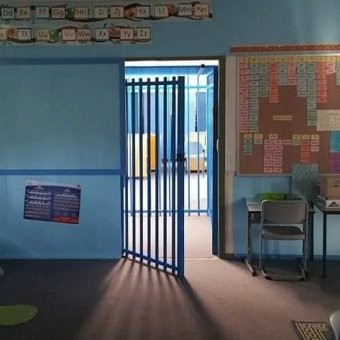

A story broke on World Autism Awareness Day in Australia's Capital that a Canberra school caged an autistic student, a student diagnosed with autism spectrum disorder (ASD), in a classroom. Several people commented that this in not a remarkable or unique story.
Previously, community concerns were sufficient that the federal Government sought to develop a National Framework for Reducing and Eliminating the Use of Restrictive Practices in the Disability Service Sector. A4 made a submission (in 2013), guidelines were published (in 2014) and, given recent accounts/reports, have been largely ineffective/dismissed/ignored (by 2015).
Usually, Governments hose down incidents like this and they disappear quickly from the media. So what is remarkable in this instance is that politicians at both the state and federal levels quickly described this instance as “unacceptable”, a sentiment that they shared with the ASD community.
The ASD community welcomes this unprecedented political response from both territory and federal Governments. But the real test is to see what the political process decides is financially, educationally and politically “acceptable” for autistic students.
These situations arise through a process.
-
Governments in Australia do not provide what they knows is best, or even good, early intervention for autistic children. Governments deny most young autistic children an equal opportunity to be prepared properly for school; autistic infants are denied access to early intervention needed to develop their skills, essential skills that they need to function and learn effectively in an education setting.
-
Autistic students usually come into school struggling, and more so students who didn't get essential early intervention.
-
A teacher can easily provoke challenging behaviours in autistic students through a variety of strategies. Sometimes a teacher provokes and repeatedly reward/reinforce challenging behaviours. Sometimes a teacher lets other students provoke challenging behaviour. The school gives its non-ASD students practical demonstrations in “how to spark up the ASD kid” … in effect, Bullying 101 is in the school's curriculum.
-
With practice, people can get an ASD kid really sparked up: the next step is to restrain him*. “Yes students, normal learning is suspended – instead, today's lesson is how to lock the ASD kid in a cage like an animal. Some of you will base your life-long attitude to intellectual and cognitive disability on this lesson.”
We leave it to the reader to contemplate the process described above from the perspective of an autistic student.
It has to be said, caging a student ranks among the worst of the inappropriate and inexcusable options for a school. A newspaper article quotes the ACT Education Director-General saying it's an example of "very poor decision-making". There are more appropriate options available but it seems these were not considered.
A key issue is that teachers are not trained to require/demand expert support when situations arise that are beyond their own expertise. The failure is through the whole education hierarchy; the classroom teacher does not install and maintain a cage in a classroom secretly or on her/his own.
These situations usually arise when others fail (or refuse) to recognise and respect a person's behaviour (a person who is diagnosed with ASD or has another communication disorder) as communication, albeit non-verbal communication. If the behaviour is sustained it is because it is reinforced … the reinforcer may not be particularly apparent/obvious.
People should understand that it is unprofessional to attempt to work beyond your training and expertise. Just as teachers in Canberra schools and elsewhere are not trained nurses (see article), teachers are not trained in clinical level behaviour intervention; they need to recognise when they need help in their classroom from relevant professionals such as behavioural professionals.
In Australia, few schools access appropriate behaviour professionals/expertise. Schools do not develop professional behaviour service plans or include expert behaviour services & supports when its needed in a student's ILP (schools don't use IEPs in the ACT because people might try to hold the school to an IEP). School culture usually expects every teacher is “a Chuck Norris” or Wonder Woman in her own classroom, sorting out all the issues alone and unaided; Victoria even provides martial arts training so teachers can confidently restrain students with ASD.
There are examples of schools allowing allied health professionals to contribute to a student's education. Even the ACT had a small therapy assistance pilot project for speech and occupational therapy. But the ACT Governments pilot did not involve behaviour therapy/services/support (possibly because they don't have any) or service for autistic students.
Teachers must be trained to recognise the need for and to access the required professional support from other disciplines, including behaviour services/supports for autistic students (or students with disability generally). The existing process, described above, is unacceptable and inexcusable**.
The consequence of inappropriate education is abysmal education outcomes for students with ASD … outcomes much worse than students with disability generally (see ABS report).
The next challenge is Australia's failure nationally to train behaviour service professionals. There is an international qualification for behaviour analysis, the Board Certified Behavior Analyst (BCBA, see here), but few people in Australia have the required training/qualification. No University in Australia trains people to BCBA standard … there are two universities in New Zealand offering the training.
Since there are so few BCBAs in Australia, schools would have difficulty accessing people with the required skills were they to try. Governments need to remedy this massive failure immediately.
The ACT Government has a particularly strong antipathy to behavioural methods. The ACT Government told the Budget Estimates Committee, proudly it seems (though this cannot be discerned confidently from the transcript), “Ms Hayes: We do not actually use [Applied Behavioral Analysis] ...”.
Access to professional behavioural services is not just a problem for schools. Most disability service providers who offer services and supports for adults with ASD say that the chronic lack of behavioural expertise is their biggest challenge. The lack of behaviour support is a major barrier to people with ASD accessing mental health services*** … and sometimes getting basic accommodation, health and dental services.
* four out of five autistic children in Australia are male (5 out of 6 in the USA).
** SOfASD is disappointed that Autism Asperger ACT (AAACT) excused the school saying “the school might well have thought it was doing the right thing”, “they try really hard” and “it sounds a bit scary” (see article), when even the Minister said it was “unacceptable”. AAACT missed the magnitude of the school's transgression. It is unfortunate, disappointing, even distressing, that AAACT does not represent the ASD community in the ACT in this issues.
*** the DSM-5 says 70% of people with ASD have comorbid mental illness. In Australia, people with ASD are usually refused access to mental health services. Yes, this is disability discrimination … but it is completely lawful discrimination in Australia.
in the media
newspaper
- Shock and sadness at 'cage' for Canberra school boy with autism: Ricky Stuart
- Canberra principal suspended after ‘cage built for autistic student’
- Graeme Innes says 'appalling' cage practice not one-off, calls for inquiry on education of children with disabilities
- P&C voice recalls learning struggles amid autism cage outrage
- Education system failing students with autism
- Cage built to lock up an autistic child was operational for 17 days
- Disability groups back call for inquiry into education of children with a disability
- Special needs boy placed in cage by Canberra school
- Canberra principal suspended after ‘cage built for autistic student’
- Children with autism caged and abused at school
- 'Deeply disturbing': Principal suspended after autistic boy, 10, is locked in a small cage by his teachers, who used specially built structure as his 'withdrawal space'
- Investigation launched at Canberra school after reports of cage-like enclosure built for child with special needs
- World Autism Awareness Day: Autistic boy, 10, kept in tiny classroom cage as ‘withdrawal space’ by teachers
- OPINION: Cage use reveals a Dark Ages attitude
other
- Autistic boy put in 'cage' at Canberra school
- 'Cage' incident sparks calls for guidelines on treatment of children with disability
- Special needs child allegedly put in cage-like 'withdrawal space' at Canberra school
- Autistic child locked in cage
- Claims use of cage for boy with autism not an isolated case, as reports of other incidents emerge on social media
- Radio Interview, ABC National
- Mistreatment widespread
- Use of cage for boy with autism at Canberra school prompts call for national education standard
- Special needs Canberra child allegedly put in cage-like 'withdrawal space' at primary school
- Special needs child locked in cage
- Students with autism need targeted attention – not a cage
Other "students and cage" media
- Parents pull kids from school
- Autistic pupil told to play in wire cage
- Strapped in and locked up
- Special needs school under investigation